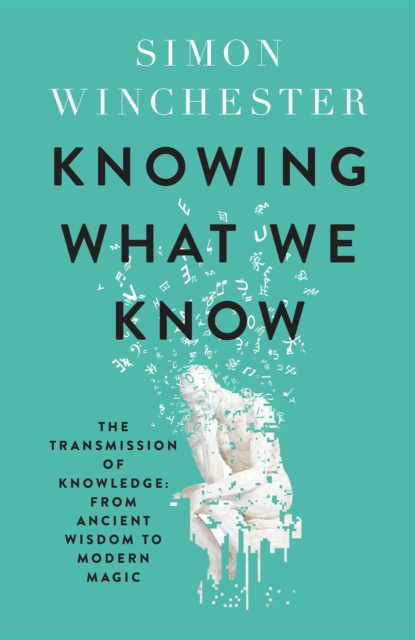
I heard about this book via a post on Chris Aldrich’s website and thought it sounded very much like my kind of thing—especially as I had previously enjoyed Simon Winchester’s The Surgeon of Crowthorne (about the creation of the Oxford English Dictionary) and The Map That Changed the World (about the first proper geological map of Great Britain).
Knowing What We Know explores the history of the recording, storage and transmission of human knowledge from the earliest cave paintings to Wikipedia. This is a fascinating and massive topic, covering such subjects as teaching, writing, libraries, printing, books, encyclopaedias, the press, and the Internet.
I have to say, I struggled to get into this book for quite some time, and found myself uncharacteristically irritated throughout much of it. I kept wondering where on earth Winchester was heading. An early lengthy account of a recent, innovative and admirable teaching initiative in Bangalore, for example, seemed like an unhelpful and unnecessary diversion. A dodgy (in the extreme) hypothesis about genetics triggering the (roughly) simultaneous invention of writing in four different parts of the world was enough to make me put the book to one side for a couple of days. I also struggled several times with confusingly worded phrases that made my head spin. How, for example, can the similarities of ancient and modern school topics be ‘surprisingly unremarkable’? Isn’t surprisingly unremarkable an oxymoron? I presume Winchester is trying to say the topics are surprisingly (or remarkably) similar. (This might sound like nit-picking, but there were times I had literally no idea what Winchester was trying to say.)
I did start to enjoy the book more after the first few chapters, being particularly interested by the sections on libraries and encyclopaedias which, it seemed to me, would make excellent topics for popular history books in their own rights.
The final section on wisdom struck me as particularly weak. Wisdom, being the application of knowledge and experience, is a perfectly valid subject on which to conclude a book about knowledge—although, again, it would make an excellent topic for a book in its own right—but Winchester limits his discussion to potted biographies of a handful of apparently randomly chosen polymaths generally admired for their wisdom. (Anyone might think polymaths were the only people capable of exhibiting wisdom!)
As you will have gathered, I was disappointed with this book, having very much looked forward to reading it. I was also frustrated more than once by the absence of references beyond a cursory ‘Books I Consulted’ section—somewhat ironic in a book about the transmission of knowledge. There is certainly plenty of interesting stuff in this book, but I couldn’t help feeling a number of shorter books on the individual topics covered would have been more rewarding.
- Buy this book from Bookshop.org (UK) and help tax-paying, independent bookshops.
- Buy this book from Amazon.co.uk
- Buy this book from Amazon.com
I share your disappointment. Winchester is a good storyteller, but a very unreliable one. As a librarian and amateur epistemologist of many decades, there were too many occasions where the facts as I know them to be differed substantially from the spin Winchester put on them. And I agree that his final section on wisdom was the least satisfying -- he never explains the connection between "knowledge", which for him is nothing more than an accumulation of facts, and "wisdom" which has to do with judgment and analysis, tempered with insight and empathy. And then, having meandered along towards his claim that there's nothing for human minds to do anymore because we no longer need to memorize facts, on his last page he upends the entire thing and contradicts everything that he's spent the rest of the book building towards.